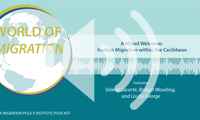
Valerie Lacarte
Senior Policy Analyst
Valerie Lacarte is a Senior Policy Analyst with MPI’s U.S. Immigration Policy Program, where she contributes to research design and conducts data analysis on a range of issues, including native-immigrant gaps in socioeconomic outcomes and access to public benefits for vulnerable immigrant and humanitarian populations.
|
Media Requests |
Prior to joining MPI, Dr. Lacarte was a postdoctoral fellow at the Institute for Women’s Policy Research where she conducted empirical analysis on women’s economic security, including the gender wage gap, paid family leave, entrepreneurship, and public-health expenditures. Previously, she worked at the Organization of American States and the Inter-American Development Bank, where she gained expertise on regional integration, with a focus on the Caribbean.
Dr. Lacarte earned a BA in economics from Université du Québec à Montréal, an MSc in economics from Université de Montréal, and a PhD in economics from American University. For her dissertation, she used a mixed-methods approach to study the integration of Caribbean immigrants into the U.S. labor market and the intersectionality of race, ethnicity, and cultural gender norms.
Bio Page Tabs
MPI Senior Policy Analyst Valerie Lacarte speaks with experts Bridget Wooding and Louby George about migration of Haitians to the Dominican Republic and the Bahamas.
This expert conversation reviews migration in nine Caribbean countries, outlining challenges and opportunities for the integration of the migrant population and a successful engagement with diasporas to advance development, along with recommendations to strengthen the region’s capacity to accommodate changing patterns of migration.
En este webinar, expertos del Banco Interamericano (BID) y el Migration Policy Institute (MPI) presentaron las principales conclusiones de su nueva publicación sobre la realidad migratoria de la región y compartieron algunos de los desafíos y oportunidades para la integración de la población migrante y para capitalizar el potencial de sus diásporas como un impulso para el desarrollo.
Recent Activity
Los países de América Latina y el Caribe están siendo transformados por crisis políticas y económicas, nuevos acuerdos de libre circulación y otras tendencias. La cantidad de inmigrantes que viven en la región casi se ha duplicado desde 2010, un cambio increíble en un corto período de tiempo. Este artículo da sentido a una profunda transición en curso en el hemisferio occidental.
En este webinar, expertos del Banco Interamericano (BID) y el Migration Policy Institute (MPI) presentaron las principales conclusiones de su nueva publicación sobre la realidad migratoria de la región y compartieron algunos de los desafíos y oportunidades para la integración de la población migrante y para capitalizar el potencial de sus diásporas como un impulso para el desarrollo.
















Addressing the Next Displacement Crisis in the Making in the Americas